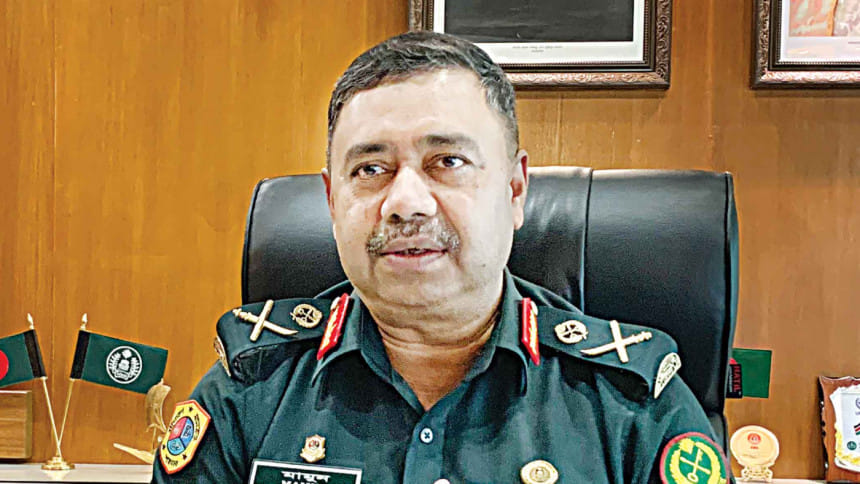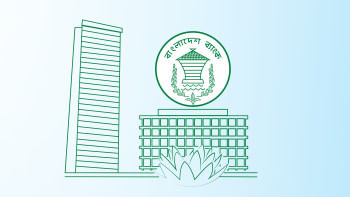Increasing capacity a big challenge

TDS: Jails are always found to be overcrowded. What steps are being taken to improve these conditions?
IG Prisons: Steps have already been taken to modernise the old jails to increase capacity. Work is already underway to re-build the Khulna, Narsingdi, Mymensingh, Cumilla, and Jamalpur district jails to increase capacity.
As emergency steps, semi-pucca tin-shade barracks are also constructed to ease jail crowding. Besides, land is being acquired for the expansion of jails.
TDS: What care do children living with their mothers in jail receive?
IG Prisons: There are around 3,222 female inmates and 349 children (170 boys and 179 girls) staying with their mothers, as they are below six years of age.
These children are getting necessary food and a diet as per doctors' suggestions. They are provided with books for education regularly, and there is a day care centre inside the jails so that they (the children) can spend time when their mothers are busy with work during the day.
TDS: What is the current state of prison medical facilities?
IG Prisons: Around 112 doctors and 86 pharmacists and nurses are now working in jails, against posts of 141 doctors and 173 pharmacists and nurses.
Jails are now equipped with sufficient medicine stocks and 15 ambulances were bought for 15 jails to ensure treatment facilities [for inmates]. The authorities will buy some more ambulances gradually.
TDS: How many foreign inmates are currently in jail and to which countries do they belong?
IG Prisons: There are around 534 foreign inmates now and they were mainly found arrested in cases over illegal entry in the country, narcotics, human trafficking, cheque forgery, and fraudulence.
These nationals are from India, Myanmar, Pakistan, Nigeria, Tanzania, Nepal, Peru, Algeria, Malaysia, Cameroon, Spain, Japan, the UK, China, Ukraine, Guineau, Mali, South Korea, Ghana, Kenya, Iran, Uganda, South Africa, and Namibia.
Of these inmates, around 112 have completed their sentences but they are still in jail as their home countries have not verified their identities yet. Some of them are staying in jail since 2003 even after the end of their sentences.
A proposal has been sent to the home ministry seeking steps to send these inmates back to their countries. Of these "released" inmates, the largest number, 99, is from India -- but they are still passing their days in jail here.
TDS: What initiatives are being taken for militants' de-radicalisation in jail?
IG Prisons: There are 631 militant inmates and they are kept in separate wards and cells under tougher vigilance so that they do not get the scope to meet others.
We are providing counselling regularly to these inmates. The Counter Terrorism and Transnational Crime (CTTC) unit and Anti-Terrorism Unit (ATU) of the police have communicated with us regarding de-radicalisation initiatives. We are hopeful of starting the formal process with psychologists and experts soon with the cooperation of these two specialised units.
TDS: What is being done to stop the illegal use of cellphones in jail?
IG Prisons: Every inmate is checked very carefully so that no one can enter the premises with a cellphone.
We are also installing a jammer [instrument used to prevent cellphones receiving signals] in every jail and increasing its strength. We are also installing some other modern equipment so that no one can use cellphones.
But cellphones are still being used as some of the jail guards are taking theirs inside although they are not authorised to do so.
We are increasing monitoring, checking CCTV regularly, and keeping our efforts on to stop the practice.
TDS: How do you deal with narcotics case inmates in jail?
IG Prisons: The narcotics case inmates are provided counselling, treatment, and motivation regularly. The jails have around 24,101 narcotics case inmates now.
We check these inmates at the jail gates when they return from court after hearings as they try to bring narcotics with them. Besides, two body scanners were installed at Dhaka and Kashimpur jails as part of ensuring proper checks.
TDS: What are the main challenges in converting jails into correction centres?
IG Prisons: A major challenge in jails is to increase capacity and we have taken on different projects for this.
Manpower shortage is another challenge for us as we are not able to oversee all inmate activities properly for this. We are working with the ministry [of home] to address the manpower shortage.
Besides, we are now providing training in different trades in only 28 out of 68 jails in the country.
Once we are able to introduce training facilities in all jails then the inmates will be able to rehabilitate themselves after completing their time, using the training. We are now getting trainers from the social welfare department.
If we get support from the narcotics department, ATU, CTTC, and other agencies like the social welfare department, then we hope that we will be able to turn jails into correction centres.

 For all latest news, follow The Daily Star's Google News channel.
For all latest news, follow The Daily Star's Google News channel. 



Comments